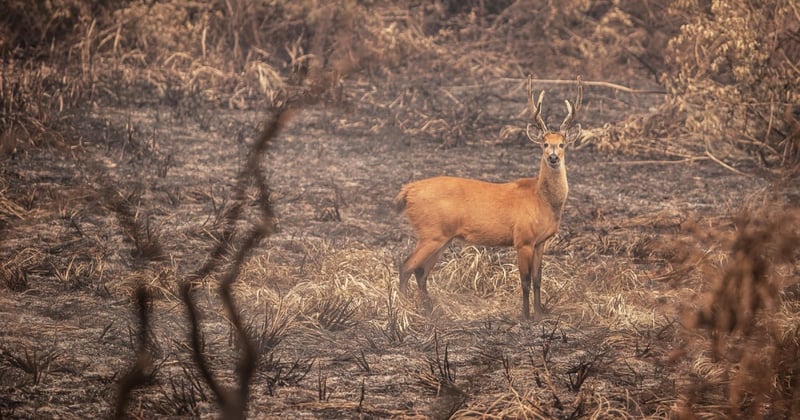
World Animal Protection welcomes G20’s commitment to tackle climate change but cautions action not words count
Press release
World Animal Protection is encouraged by the G20’s commitment to play its full part to limit the global temperature rise to 1.5C - but warns the world’s richest nations they must put their money where their mouth is if they are to remain credible in the climate battle
Responding to the pledge made from the G20 summit in Bali, Wednesday, to strive to limit global warming to 1.5C, World Animal Protection’s Director of External Engagement, Kelly Dent - who is attending COP27, said: “The world- especially the Global South - needs leadership from the G20, as does COP27.
“It is only right that the largest economies with 85 percent of global GDP and who emit 80% of greenhouse gas emissions lead by example.
“The G20 is also home to the four factory farming hotspots - the silent climate culprit responsible for not only immense cruelty, but also significant methane and other pollutant emissions.
“But transforming their commitments into concrete actions and deep transformation in key sectors, is crucial if we are to keep the 1.5C COP26 pledge and 2015 Paris Agreement alive.
“This means taking action on food systems which are responsible for a third of emissions.
“G20 leaders as should COP27 must publicly recognise that factory farming is a major contributor to climate change, public health issues, deforestation and other biodiversity loss.
“Factory farming’s climate footprint includes demand for animal feed production and imported products including animal feed, meat and dairy.
“Planting crops to feed animals in factory farms destroys and locks up land that could be used as wildlife habitat or land that could be used to feed humans directly - so this system is also undermining food security.
“So we urge G20 leaders to spell out what and how and when they plan to create a sustainable, humane and resilient agriculture and food systems – including supply chains - that protect animals, humans and the planet.”
Dent added: “We are also disappointed that - yet again - the G20 refuses to acknowledge the urgent need to end the commercial wildlife trade if we are to minimise pandemics risk.
“Whilst we are pleased the G20 has reaffirmed its commitment to a One Health approach and recognises the threat of antimicrobial resistance (AMR), we cannot prevent future pandemics without addressing the wildlife trade.” World Animal Protection’s recently released Climate Change and Cruelty report revealed the true extent of unsustainable deforestation caused by factory farming – a silent climate culprit. When deforestation to grow feed crops – especially soya - for global trade is considered, this doubles the overall climate change impact of factory farmed meat in the Netherlands and increases the impact by more than one and a half times in China.
As the Climate Change and Cruelty report exposes, factory farming in the world’s biggest economies discharge disproportionate emissions with a global impact, affecting countries and communities in less developed areas like Africa – even though they do little to contribute to the problem.
To address this injustice, governments should promote humane and sustainable food systems, including moving to higher welfare for farmed animals, promoting a reduction of meat consumption and an increase in protein-rich, plant-based diets.
Note to editors:
Facts from the report the Climate Change and Cruelty Report:
- The 4 biggest factory farming markets of the world are China, Brazil, US and Europe.
- Meat consumption rates in 2020 for the four-factory farming hot spots are already high.
- Europeans consume around 33kg of pork per person per year and 23kg of chicken. Brazilians eat 41kg of chicken and 12kg of pork each year, US people eat 23kg of pork and 50kg of chicken and in China, pork is the most consumed meat, with 26kg per person and 14kg of chicken.
- The climate impacts of factory farmed chicken alone in these factories farming hot spots is the equivalent of driving almost 29 million cars for a year.
- Animal feed production is the dominant contributor to factory farming’s climate impact.
- A million kilograms of factory farmed chicken need almost 4.3 million square metres of land dedicated to animal feed, while a million kilograms of factory farmed pork needs around 5.8 million square metres of land dedicated to animal feed. That’s around the size of 672-906 football fields which is an area that can accommodate up to 1.45 million trees.
- For every 100 calories of crops fed to farmed animals, only 17-30 calories end up feeding people2. Meat and dairy provide only 18% of overall calories and 37% of protein for humans, but they use 83% of farmland3. It is far better to grow crops that feed humans directly through mostly plant-based diets.
- Methane from the manure of factory farmed pigs accounts for 21% of overall pork emissions for Netherlands, 22% for US, and 24% for Brazil.
- By 2040, China’s per person annual consumption of chicken is expected to have increased from current levels to 15kg and pork to 31kg. Increases in chicken consumption are alsoexpected in Brazil, US and Organisation for Economic Co-operation and Development (OECD)4 countries at 43kg, 53kg and 25kg respectively. For pork, consumption may reach 13kg for Brazil, 24kg for the US and 32kg for OECD countries.
- Increases in pork and chicken consumption will result in notable increases in climate and environmental impacts.
- Conversely, reducing pork per person by 50% by 2040 would result in a 41% decrease in climate change impacts from pork consumption in China, 54% for the EU, 44% for Brazil and 43% for the US13.
Ends all.